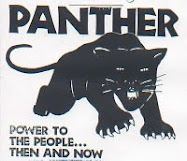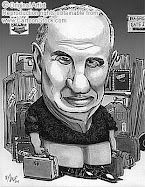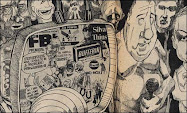http://www.newsobserver.com/105/story/635667.html

After World War II, Germans were caught between the past and the future. While trying to rebuild and reimagine a nation, they had to confront the horrific crimes they had committed during Hitler's reign.
Their challenge was to find ways to own up to their awful past that permitted them to go forward. Two of the earliest examples -- "Rotation" (1949) and "Council of the Gods" (1950), from First Run Features -- are among the most compelling.
"Rotation" begins during the dark days of economic depression during the early 1930s. Living with his wife and first child in a dank cellar, Hans Behnke is desperate for work. When the Nazis take power in 1933, Hans gets a good job as a mechanic at a newspaper press. Hans is no Brown Shirt; he finds Hitler despicable. When this aversion costs him promotions at work and brings menacing visitors to his home, he joins the party. When his Jewish neighbors are carted away, he just shakes his head. He has traded his conscience for prosperity.
As the war turns against Germany, Hans' communist brother-in-law persuades him to print anti-Nazi leaflets. Hans' son, a member of Hitler Youth, discover his father's "crime" and reports him to the police. Ultimately, after great pain and suffering, the movie ends on a note of hope for Hans (and Germany) as he forgives his son.
"Rotation" sounds two interpretations of Nazism that would be heard often in Germany during the post-war era: It was something done to us; it was something we allowed to happen. We might fault them for not saying "This is what we did," but it is hard for people to face their darkest sides head-on all at once. "Rotation" suggests that as they rebuilt their nation, Germans needed to tell themselves a story about the past that contained enough truth to reflect reality and enough forgiveness so they wouldn't be crushed by guilt.
"Council of the Gods" is less forgiving, perhaps because its focus is narrower. It draws on historical records to depict how German companies -- especially industrial conglomerate I.G. Farben -- and scientists profited from the Nazis. The businessmen, who work closely with U.S. companies, are not portrayed as true believers in Hitler's cause but arrogant plutocrats, devoid of empathy. Their chief ideology is capitalism. A scientist who works for them has a conscience, but he is quick to divorce his research from its applications. Denial is his response when he sees that a deadly gas he developed, Zyklon B, is being to sent to concentration camps.
All are brought to trial after the war. The businessmen try to slither from blame; the scientist accepts it and, sounding a hopeful note, is redeemed.
It's noteworthy that both films were made in East Germany, which was under Soviet control. It is no accident that the communist in-law is the most noble figure in "Rotation" or that capitalists take it on the chin in "Council of the Gods."
First Run Features has also released two powerful documentaries about the Nazi concentration camp at Auschwitz. "Verdict on Auschwitz" (1993) offers a wide-angled view, depicting horrors through footage from the trial that took place in Frankfurt from 1963 to 1965. In it, about 360 witnesses -- including 211 concentration camp members -- confronted members of Hitler's SS.
"Forgiving Dr. Mengele" (2006) is a more personal story, as Eva Kor describes the sadistic experiments conducted upon her and her twin Miriam by the infamous doctor at Auschwitz, Josef Mengele. Against Mengele's inhumanity, Eva offers a startling vision of hope as she explains how she came to forgive him.




